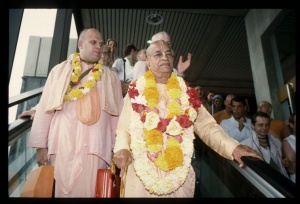SB 10.1.67: Difference between revisions
m (1 revision(s)) |
No edit summary |
||
| Line 1: | Line 1: | ||
{{info | {{info | ||
|speaker= | |speaker=Śukadeva Gosvāmī | ||
|listener=King | |listener=King Parīkṣit | ||
}} | }} | ||
[[Category:Srimad-Bhagavatam - Canto 10 Chapter 01]] | |||
[[Category:Bhagavatam Verses Spoken by Sukadeva Gosvami - Vanisource|100167]] | |||
<div style="float:left">'''[[Srimad-Bhagavatam]] - [[SB 10|Tenth Canto]] - [[SB 10.1: The Advent of Lord Krsna: Introduction|Chapter 1: The Advent of Lord Kṛṣṇa: Introduction]]'''</div> | |||
<div style="float:right">[[File:Go-previous.png|link=SB 10.1.65-66]] '''[[SB 10.1.65-66]] - [[SB 10.1.68]]''' [[File:Go-next.png|link=SB 10.1.68]]</div> | |||
{{RandomImage}} | |||
==== TEXT 67 ==== | ==== TEXT 67 ==== | ||
<div | <div class="verse"> | ||
mātaraṁ pitaraṁ bhrātṟn | :mātaraṁ pitaraṁ bhrātṟn | ||
sarvāṁś ca suhṛdas tathā | :sarvāṁś ca suhṛdas tathā | ||
ghnanti hy asutṛpo lubdhā | :ghnanti hy asutṛpo lubdhā | ||
rājānaḥ prāyaśo bhuvi | :rājānaḥ prāyaśo bhuvi | ||
</div> | </div> | ||
| Line 17: | Line 22: | ||
==== SYNONYMS ==== | ==== SYNONYMS ==== | ||
<div | <div class="synonyms"> | ||
''mātaram''—unto the mother; ''pitaram''—unto the father; ''bhrātṟn''—unto brothers; ''sarvān ca''—and anyone else; ''suhṛdaḥ''—friends; ''tathā''—as well as; ''ghnanti''—they kill (as it is practically seen); ''hi''—indeed; ''asu-tṛpaḥ''—those who envy the lives of others for their personal sense gratification; ''lubdhāḥ''—greedy; ''rājānaḥ''—such kings; ''prāyaśaḥ''—almost always; ''bhuvi''—on the earth. | |||
</div> | </div> | ||
| Line 24: | Line 29: | ||
==== TRANSLATION ==== | ==== TRANSLATION ==== | ||
<div | <div class="translation"> | ||
Kings greedy for sense gratification on this earth almost always kill their enemies indiscriminately. To satisfy their own whims, they may kill anyone, even their mothers, fathers, brothers or friends. | Kings greedy for sense gratification on this earth almost always kill their enemies indiscriminately. To satisfy their own whims, they may kill anyone, even their mothers, fathers, brothers or friends. | ||
</div> | </div> | ||
| Line 31: | Line 36: | ||
==== PURPORT ==== | ==== PURPORT ==== | ||
<div | <div class="purport"> | ||
We have seen in the history of India that Aurangzeb killed his brother and nephews and imprisoned his father to fulfill political ambitions. There have been many similar instances, and Kaṁsa was the same type of king. Kaṁsa did not hesitate to kill his nephews and imprison his sister and his father. For demons to do such things is not astonishing. Nonetheless, although Kaṁsa was a demon, he was aware that Lord Viṣṇu cannot be killed, and thus he attained salvation. Even partial understanding of the activities of Lord Viṣṇu makes one eligible for salvation. Kaṁsa knew a little about Kṛṣṇa—that He could not be killed—and therefore he attained salvation although he thought of Viṣṇu, Kṛṣṇa, as an enemy. What then is to be said of one who knows Kṛṣṇa perfectly from the descriptions of śāstras like Bhagavad-gītā? It is therefore the duty of everyone to read Bhagavad-gītā and understand Kṛṣṇa perfectly. This will make one's life successful. | We have seen in the history of India that Aurangzeb killed his brother and nephews and imprisoned his father to fulfill political ambitions. There have been many similar instances, and Kaṁsa was the same type of king. Kaṁsa did not hesitate to kill his nephews and imprison his sister and his father. For demons to do such things is not astonishing. Nonetheless, although Kaṁsa was a demon, he was aware that Lord Viṣṇu cannot be killed, and thus he attained salvation. Even partial understanding of the activities of Lord Viṣṇu makes one eligible for salvation. Kaṁsa knew a little about Kṛṣṇa—that He could not be killed—and therefore he attained salvation although he thought of Viṣṇu, Kṛṣṇa, as an enemy. What then is to be said of one who knows Kṛṣṇa perfectly from the descriptions of ''śāstras'' like [[Bhagavad-gita As It Is (1972)|''Bhagavad-gītā'']]? It is therefore the duty of everyone to read [[Bhagavad-gita As It Is (1972)|''Bhagavad-gītā'']] and understand Kṛṣṇa perfectly. This will make one's life successful. | ||
</div> | </div> | ||
__NOTOC__ | |||
<div style="float:right; clear:both;">[[File:Go-previous.png|link=SB 10.1.65-66]] '''[[SB 10.1.65-66]] - [[SB 10.1.68]]''' [[File:Go-next.png|link=SB 10.1.68]]</div> | |||
__NOTOC__ | |||
__NOEDITSECTION__ | |||
Revision as of 07:30, 18 May 2021

A.C. Bhaktivedanta Swami Prabhupada
TEXT 67
- mātaraṁ pitaraṁ bhrātṟn
- sarvāṁś ca suhṛdas tathā
- ghnanti hy asutṛpo lubdhā
- rājānaḥ prāyaśo bhuvi
SYNONYMS
mātaram—unto the mother; pitaram—unto the father; bhrātṟn—unto brothers; sarvān ca—and anyone else; suhṛdaḥ—friends; tathā—as well as; ghnanti—they kill (as it is practically seen); hi—indeed; asu-tṛpaḥ—those who envy the lives of others for their personal sense gratification; lubdhāḥ—greedy; rājānaḥ—such kings; prāyaśaḥ—almost always; bhuvi—on the earth.
TRANSLATION
Kings greedy for sense gratification on this earth almost always kill their enemies indiscriminately. To satisfy their own whims, they may kill anyone, even their mothers, fathers, brothers or friends.
PURPORT
We have seen in the history of India that Aurangzeb killed his brother and nephews and imprisoned his father to fulfill political ambitions. There have been many similar instances, and Kaṁsa was the same type of king. Kaṁsa did not hesitate to kill his nephews and imprison his sister and his father. For demons to do such things is not astonishing. Nonetheless, although Kaṁsa was a demon, he was aware that Lord Viṣṇu cannot be killed, and thus he attained salvation. Even partial understanding of the activities of Lord Viṣṇu makes one eligible for salvation. Kaṁsa knew a little about Kṛṣṇa—that He could not be killed—and therefore he attained salvation although he thought of Viṣṇu, Kṛṣṇa, as an enemy. What then is to be said of one who knows Kṛṣṇa perfectly from the descriptions of śāstras like Bhagavad-gītā? It is therefore the duty of everyone to read Bhagavad-gītā and understand Kṛṣṇa perfectly. This will make one's life successful.